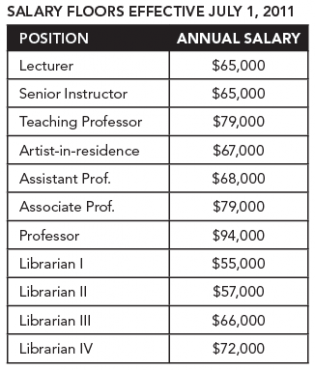Bargaining between the UVic Faculty Association (FA) and the administration continues as a contract has yet to be agreed upon by the two sides. On Jan. 7, the FA applied to the Labour Relations Board to request that a mediator be brought in, and Trevor Sones was appointed on Jan. 12. According to the UVic website, the FA stated that the reasoning behind the mediation was that “the current approach was unlikely to be productive.” After the mediator was brought in, a gag order was issued, therefore any public communication about discussions taken place in the presence of the mediator is prohibited. Though the Martlet contacted several individuals involved in the bargaining process, no one was willing to comment due to the communication ban.
A UVic faculty member with knowledge of the negotiations and asking to remain anonymous stated over email that, “Without warning, the FA leadership shut down a listserv used for communications between members (basically debate about FA policy and governance). Dissent had been increasing on that listerv.”
Faculty at UVic have been certified as a union since January 2014, when a certification vote passed with 448 votes to 263. As a first contract has yet to be agreed upon by both parties, the nearly 900 faculty members at UVic have been working without a contract and under the previous framework agreement, which expired on June 30, 2014.
 According to the FA’s website, the framework agreement is a legal employment contract between the Faculty Association and the UVic Administration that has been in place (in various forms) for more than 20 years.The Framework Agreement will remain in place until the first collective agreement between the Faculty Association and UVic Administration is agreed upon.
According to the FA’s website, the framework agreement is a legal employment contract between the Faculty Association and the UVic Administration that has been in place (in various forms) for more than 20 years.The Framework Agreement will remain in place until the first collective agreement between the Faculty Association and UVic Administration is agreed upon.
Since its certification, the UVic FA represents Assistant Professors, Associate Professors, Professors, Librarians, Archivists, Assistant Teaching Professors, Limited Term Faculty, Artists-in-Residence and Lecturers at UVic. Because teachers assistants and sessional instructors fall under the UVic Educational Employees Union, or CUPE local 4633, grad students instructors and TAs are not directly affected by these bargainings.
At other universities, labour negotiations have proven contentious. Since their unionization in April 2014, UNBC’s Faculty Association also has yet to agree upon a first contract. Last week, due to bargaining complications, UNBC’s FA passed a vote to strike with 84 per cent in favour. Faculty members now have 90 days to decide to take strike action or not. Teaching assistants, sessionals, and other staff at the University of Toronto are also slated to strike by the end of February if an agreement cannot be reached.
There is still no official talk of a strike at UVic; however, the same UVic faculty member wrote that, “I think there’s a real possibility of a strike occurring this term, especially if people like students don’t pay attention and ask important questions of both sides.” They also posited that for maximum effectiveness, a strike would have to happen when the most students are at the university, and not during the summer when many classes are taught by sessionals (who are unaffected by this round of bargaining).
Historically, if university staff go on strike, it is often students who are affected the most. Famously, the strike at York University started in Nov. 6, 2008 and didn’t end until Jan. 29, 2009. Students were never refunded for lost tuition and exams for the semester were pushed back as far as late June.
As of July 2011, the salary floor for an assistant professor was $68 000, along with potential salary adjustments depending on years worked or merit. In a background document intended to provide information on the bargaining processes on the FA website, the FA stated, “It’s general knowledge that faculty and librarian salaries are lower at UVic than at almost any other comparable university in the country. The Administration acknowledged this during the 2012 bargaining round, and the arbitrator’s decision after the 2012 negotiations accepted the statement. During negotiations for our first collective agreement as a certified association, the FA is seeking to remedy this and we are expecting the Administration to live up to its past acknowledgement.”
The faculty member said that, “The university wants [professors] teaching and doing research at as low a cost as they can. That’s what all employers want.”
On Jan. 16, the union rejected the first outline of the agreement proposed by the administration on Dec. 9. According to an update by the university administration, the union distributed its rejection to members in a document entitled, “Top Ten Threats to Faculty Association Member Rights.” The administration claims that it is being misrepresented in its proposed issues as their website stated that, “We believe that the Union negotiating team’s response does not correctly represent either the Outline in Principle or what has happened at the bargaining table.”
Negotiations for other unions, including one that represents continuing instructors, sessional instructors, and music performance instructors have now begun. Other university staff, including teaching assistants, will go to the bargaining table in the coming months.






